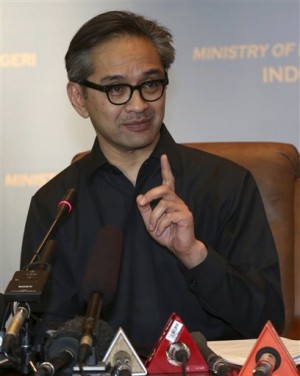Indonesian leader deplores statement by Aussie PM

Indonesian Foreign Minister Marty Natalegawa speaks during a press conference in Jakarta, Indonesia, Monday, Nov. 18, 2013. Indonesia has recalled its ambassador from Australia and is reviewing bilateral cooperation after reports that an Australian security agency attempted to listen in on Indonesian President Susilo Bambang Yudhoyono’s cellphone in 2009. AP
JAKARTA, Indonesia (AP) — Indonesia’s president said Tuesday he deplored as remorseless the Australian prime minister’s statement about alleged wiretapping on his phone and said cooperation agreements between the near-neighbors would be reviewed.
In Canberra, Australian Prime Minister Tony Abbott endorsed intelligence gathering in principle without confirming or denying the reported spying under a previous government in 2009.
In a series of tweets confirmed by his office, President Susilo Bambang Yudhoyono reacted strongly. One in an Indonesian language said, “I also deplore the statement of Australian Prime Minister who underestimates the wiretapping of Indonesia, without sense of guilt.”
A later English tweet used the word regret instead of deplore and said the statement “belittled this tapping matter on Indonesia, without any remorse.”
Yudhoyono tweeted that Indonesia wanted an official Australian response that could be understood and that bilateral cooperation agreements would be reviewed as a consequence of “this hurtful action.”
Indonesia already has recalled its ambassador following the reports that Australian spies attempted to listen to the president’s cellphone in 2009.
Analysts describe the furor as the lowest point in a perennially volatile bilateral relationship since 1999 when Australia led a U.N. military force into the former Indonesian province of East Timor following a bloody independence ballot. On that occasion, Indonesia ripped up a 4-year-old security treaty with Australia. A new treaty has since been signed.
Australian Broadcasting Corp. and The Guardian reported that they had documents from National Security Agency leaker Edward Snowden showing that the top-secret Australian Signals Directorate also targeted the phones of Indonesian first lady Kristiani Herawati and eight other government ministers and officials.
Abbott told Parliament on Tuesday he regretted any embarrassment that the spying reports had caused Yudhoyono but ruled out demands for an apology and explanation.
“I regard President Yudhoyono as a good friend of Australia, indeed as one of the very best friends that we have anywhere in the world,” Abbott said. “That’s why … I sincerely regret any embarrassment that recent media reports have caused him.”
But he said national security required consistent determination to do what’s best, and his government would support how past governments chose to do that. “Australia should not be expected to apologize for the steps we take to protect our country now or in the past, any more than other governments should be expected to apologize for the similar steps that they have taken,” he said.
Abbott also made similar comments to those already condemned by Yudhoyono as remorsely belittling the tapping controversy.
“The first duty of every government is to protect the country and to advance its national interests,” Abbott said. “That’s why every government gathers information and why every government knows that every other government gathers information.”
Indonesian Ambassador Nadjib Riphat Kesoema left Australia on
Tuesday morning, urging its government to come clean.
“I think a good explanation will be the best way … to ease the problem,” Kesoema told reporters at Canberra airport.
The diplomatic spat is an early test for Abbott’s government, which was elected in September and is anxious to cement ties with it populous near-neighbor before the uncertainty of Indonesian presidential elections next year.
Australia wants to increase cooperation against human traffickers who ship asylum seekers in rickety boats from the Indonesian archipelago to Australian shores.
Indonesia temporarily recalled its Australian ambassador in 2006 in protest at Australia accepting as refugees 42 asylum seekers from the restive Indonesian province of West Papua. Australia accepted that they faced persecution under Indonesian rule if they had returned home.
Greg Fealy, an Australian National University expert on Australia-Indonesia relations, said the bilateral relationship was at its lowest point since 1999.
“Depending on the Australian government’s response, it could still get worse,” Fealy said.